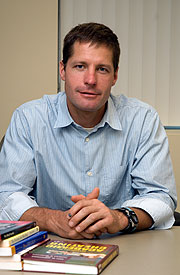  |
| HOME | THIS ISSUE | CALENDAR | GRANTS | BACK ISSUES | < BACK | NEXT > |
Educational psychologist examines factors that lead students to cheatby Sherry Fisher - September 24, 2007 | ||||
| Nine out of 10 high school students say they have cheated on homework assignments. Two out of three have reported cheating on a test. Seven out of 10 college students have engaged in some form of academic misconduct – from test cheating to plagiarism. Yet most students think cheating is wrong. “That’s what fascinates me,” says Jason Stephens, an assistant professor of educational psychology whose research focuses on academic dishonesty. “The fact that people make moral judgments about something they should or should not do, and then act in ways that are inconsistent with that judgment. I call this phenomenon belief-behavior incongruity.” Stephens’ research examines the psychological, situational, and social contextual factors that affect students’ decisions to cheat and lead to belief-behavior incongruity. “I’ve looked at the role of moral reasoning, moral identity, and moral disengagement, and how that plays on students’ decisions to break the rules, their perceptions of peer norms related to cheating, and their perceptions of their teachers and the kinds of learning environments they have created.” Over the years, his research has involved thousands of high school and college students who have participated in surveys, focus groups, and individual interviews. The strongest predictor of cheating in Stephens’ research is moral disengagement, or the extent to which a student tends to disengage or neutralize personal responsibility for his or her behavior by displacing onto others. Teachers and aspects of the peer culture are the strongest targets of this diffusing of responsibility, he says. “When we’ve done something we believe to be wrong, we want to resolve the dissonance and protect our ego or sense of self as a good person,” he says. “Disengagement mechanisms, such as displacement of responsibility, serve such ego defense needs. So in the case of academic dishonesty, students do this by blaming their teachers for being poor teachers or creating unfair tests. Students also diffuse responsibility by rationalizations such as, ‘everyone else is doing it.’” Not surprisingly, this tendency to disengage moral control is less likely among students with strong moral identities, Stephens says. “What seems to matter is the extent to which they feel they are a moral person. The more you possess a moral sense of self, the more you demand self-consistency between your beliefs and behaviors, the less likely you are to cheat.” Stephens says several academic factors put students at risk for cheating. One is the extent to which someone is oriented toward mastery. “Students who have a mastery goal orientation are interested in developing their competence,” he says. “The extent that you’re in it to learn and you love learning, the less likely you are to cheat.” If, however, a student is performance goal-oriented, he or she will be more likely to cheat, according to Stephens.
“These individuals are looking to demonstrate their competence, not develop it. These are the kids who want to show us that they’re smart. They’re concerned about how others perceive them.” Stephens says the propensity to cheat is also affected by the extent to which students feel able to handle academic pressures. “Another key motivational factor here is self-efficacy or the extent to which you feel able to meet the demands,” he says. “There are many students who don’t feel especially able in math or science, for example, and resort to cheating to compensate for their perceived incompetence. The problem is exacerbated by grade pressures associated with getting into a good college. “Nowadays, if you’re a high school student, there’s a feeling that not only do you have to have a 4.0, you have to be playing a varsity sport, belong to an extracurricular club, do volunteer work, and perhaps hold a job on top of it. So there is a broader context that is really important. We have to remember, as psychologists John Dewey and Kurt Lewin said, that behavior is a function of the person times the environment.” Stephens and a colleague from another institution have just received a $400,000 grant from the John Templeton Foundation to conduct a three-year pilot intervention study in high schools. “Our big goal is to change the culture of high schools in terms of students’ attitudes and behaviors related to academic integrity,” he says. “Students don’t think cheating is a big deal, and in a world filled with ongoing moral atrocities such as war, genocide, hunger, and exploitation, it isn’t. If someone were to ask me why I care about academic dishonesty – which may seem minute in the universe of wrongdoing – I’d say it’s like a death of a thousand cuts. “Adolescents are at a critical period of identity formation, and as a researcher and educator, I’m interested in creating learning environments that help students develop not only intellectually but also socially and morally,” he says. Stephens says the high school intervention project will be led by students. “We’re pulling together the more influential students in the schools, trendsetters who are valued and emulated by their peers.” The project will also include a series of workshops for teachers. “Some teachers may facilitate cheating by creating performance-oriented environments,” he says. “They create these situations by the way they arrange their own curriculum goals, how they carry out their assessment practices, and the formal and informal ways in which they communicate with their students. I want to work with teachers so they can create motivational climates that are more inclusive, support autonomy, and are oriented toward mastery.” |
| ADVANCE HOME UCONN HOME |

